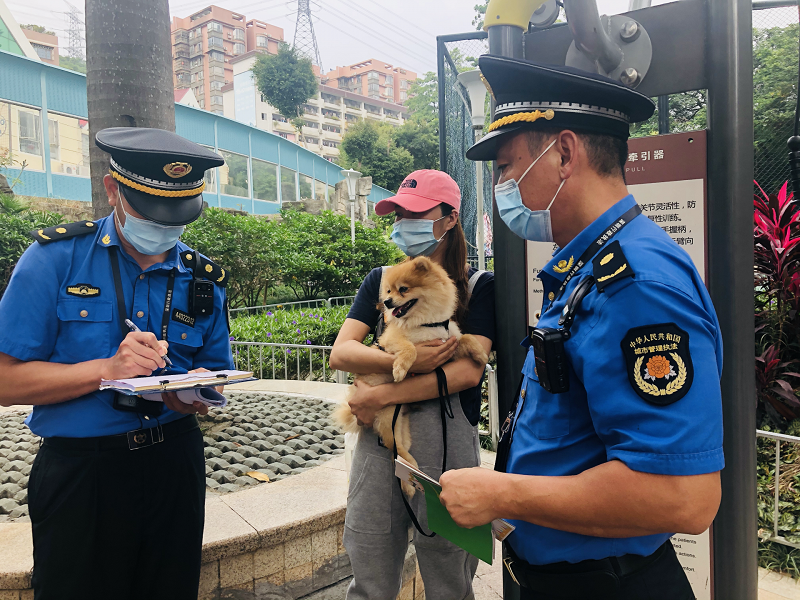Owners raising unchipped dogs face punishment
Writer: Wang Jingli | Editor: Holly Wang | From: Shenzhen Daily | Updated: 2020-11-02

Law enforcement officers release a notice to a citizen who is found raising an unchipped dog in Qingshuihe Subdistrict, Luohu District on Thursday. DT News
Dog owners in Shenzhen will be punished if found raising unchipped dogs, as the pet dog raising regulation was officially implemented yesterday.
According to the regulation, all dogs should be microchipped within 30 days of being registered on the city’s management system and smart tag information being recorded.
All dogs aged beyond three months should be registered on the city’s management system. The registration can be applied either at designated service centers and pet hospitals or via the WeChat account, mlszgzh (美丽深圳).
A total of 256 pet hospitals across the city have been given permission to offer free microchipping for dogs that have already registered in the city.
The microchipping reservation service is also available through the WeChat account mlszgzh.
If dogs cannot be microchipped at the moment due to special reasons, they are allowed to postpone the microchip injection after receiving approval from a licensed vet.
Dogs that are not suitable to have a microchip inside their bodies should have permits from the municipal authority.
During a campaign held Thursday in Qingshuihe Subdistrict in Luohu District, law enforcement officers released a notice to a citizen surnamed Zhao who was found raising an unchipped dog.
Zhao was required to microchip her dog within seven days.
In addition, the regulation stipulated that the length of a leash for super small and small dogs should not exceed 2 meters while the length for medium and large dogs should not exceed 1.5 meters.
At present, about 40 percent of registered dogs in the city have been successfully microchipped, according to the municipal urban management and law enforcement bureau.
The bureau said that they will continue promoting microchip implants to ensure all registered dogs in the city are microchipped by the end of this year.
The chip, which is said to last for at least 15 years and is the size of a grain of rice, is implanted under the skin of a dog’s neck. Each chip, when scanned by authorized personnel, reveals a unique 15-digit number matching the dog’s name and breed, as well as its owner’s identity and contact information — which will help reduce strays. The microchip doesn’t track the dog’s location; nor does the authority store its owner’s personal information, according to earlier local media reports.
The Shenzhen government is footing the bill for all the implants.
The city owned around 200,000 dogs and cats in 2019, according to official data. The total number of dogs and cats nationwide grew 8.4 percent year over year to nearly 1 billion in 2019, an industry white paper showed.